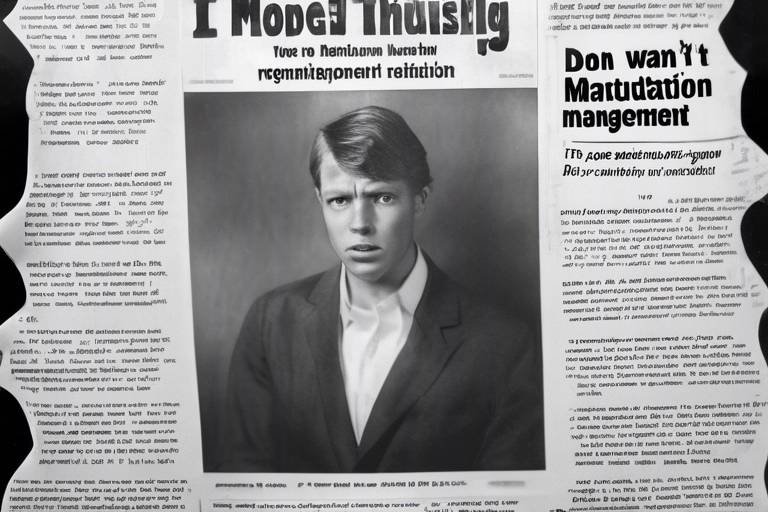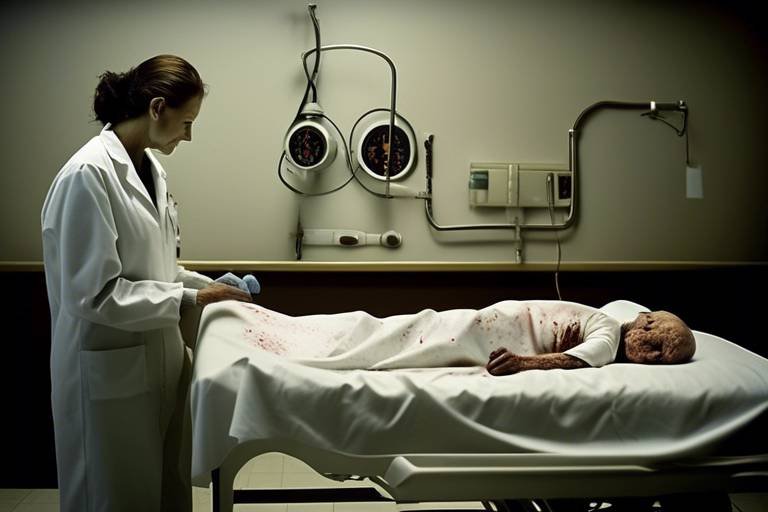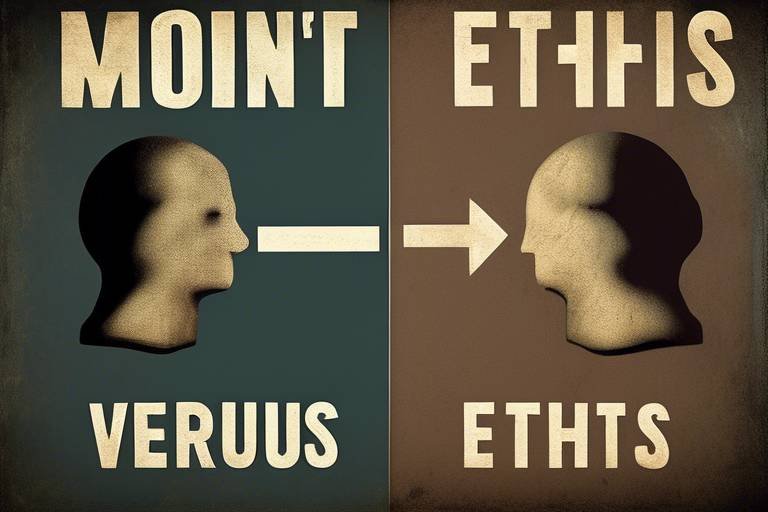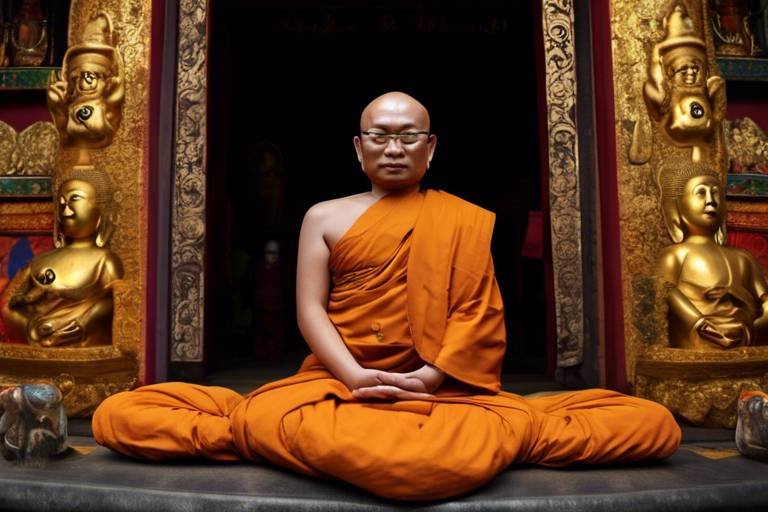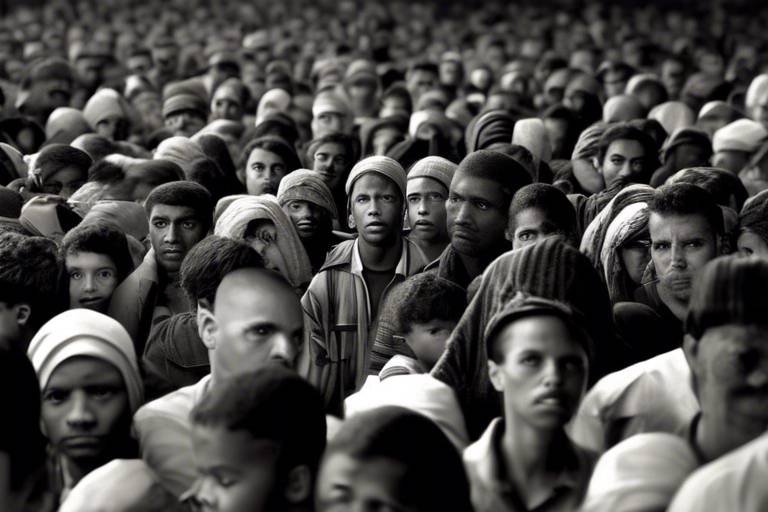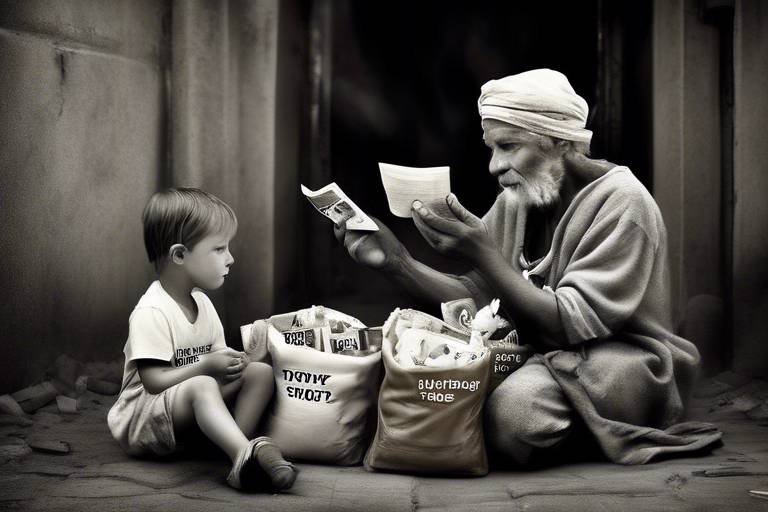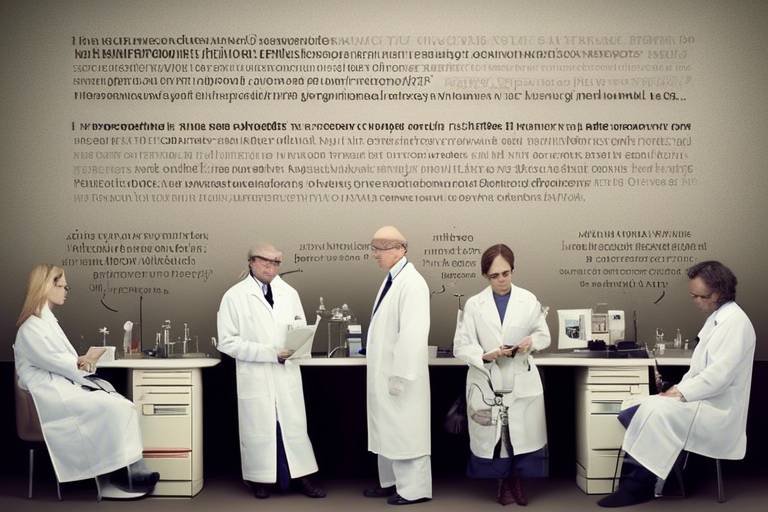Unraveling the Ethics of Pro-Choice and Pro-Life
The debate between pro-choice and pro-life perspectives is not just a matter of personal belief; it's a complex tapestry woven from threads of ethics, morality, and human rights. As society grapples with issues surrounding reproductive rights, understanding the nuances of each stance becomes crucial. Both sides present compelling arguments that reflect deep-seated values and beliefs, making the conversation not only important but also deeply personal for many individuals. This article aims to explore the ethical landscape of this ongoing debate, shedding light on the moral, social, and legal implications that arise from each viewpoint.
At its core, the pro-choice movement advocates for a woman's right to make decisions about her own body, emphasizing autonomy and individual freedom. On the flip side, the pro-life movement stresses the sanctity of life, arguing that the fetus deserves protection from the moment of conception. These opposing views raise a myriad of questions: What does it mean to be truly free? At what point does life begin? And how do societal norms influence our perception of these issues?
When we delve into the ethical implications of these positions, we find ourselves navigating a landscape filled with emotional, philosophical, and legal challenges. The pro-choice stance often highlights the importance of bodily autonomy, suggesting that women should have the ultimate authority over their reproductive choices. This perspective is rooted in the belief that personal rights and freedoms are paramount in a democratic society.
Conversely, the pro-life argument is heavily influenced by various ethical teachings that prioritize the protection of potential life. Many proponents of this view argue that life begins at conception, and therefore, the fetus should be granted rights similar to those of a born individual. This belief raises significant ethical questions about when personhood begins and how society should balance the rights of the mother against the rights of the unborn.
In the end, the ethics of pro-choice and pro-life are not just theoretical discussions; they have real-world implications that affect millions of lives. As we continue to navigate this complex issue, it is essential to consider the perspectives of both sides and engage in respectful dialogue that acknowledges the deeply held beliefs of others.
- What is the main difference between pro-choice and pro-life?
Pro-choice advocates for a woman's right to choose whether to continue a pregnancy, while pro-life emphasizes the rights of the unborn fetus, arguing for its protection. - How do religious beliefs influence the pro-life movement?
Many pro-life supporters draw on religious teachings that emphasize the sanctity of life, viewing abortion as morally wrong based on their faith. - What are the legal implications of pro-choice and pro-life stances?
The legal landscape varies by jurisdiction, with landmark cases like Roe v. Wade shaping abortion rights in the United States, while state legislation continues to evolve. - How do these movements impact women's rights?
Pro-choice movements often advocate for women's autonomy and access to healthcare, while pro-life perspectives can lead to restrictions that affect women's reproductive rights.

Historical Context
The journey of the pro-choice and pro-life movements has been anything but straightforward. To truly grasp the complexities of this debate, it's essential to look back at the historical context that has shaped these perspectives. The roots of the pro-choice movement can be traced back to the early 20th century when women's rights began to gain traction. Activists fought for the right to control their own bodies, advocating for access to contraception and safe abortion procedures. This movement gained momentum in the 1960s, culminating in the landmark Supreme Court case, Roe v. Wade, in 1973, which recognized a woman's legal right to choose an abortion. This decision marked a significant victory for pro-choice advocates, affirming the notion that personal autonomy and privacy are fundamental rights.
On the flip side, the pro-life movement has its origins in a combination of religious beliefs and a growing concern for fetal rights. The 1960s and 1970s saw a surge in activism from various religious groups who viewed abortion as a moral atrocity. They argued that life begins at conception and that terminating a pregnancy is tantamount to taking a life. This perspective has been deeply rooted in the teachings of various faiths, emphasizing the sanctity of life and the moral obligation to protect the unborn.
Over the decades, both movements have evolved, often responding to shifting societal values and legal rulings. The pro-choice movement has increasingly framed its arguments around women's rights, bodily autonomy, and public health, while the pro-life movement has focused on the moral implications of abortion and the rights of the unborn. This ongoing tug-of-war has not only influenced public opinion but has also affected legislative actions across the United States and beyond.
To better understand how these movements have developed, let’s take a look at a timeline of significant milestones:
| Year | Event |
|---|---|
| 1965 | The Supreme Court rules in Griswold v. Connecticut, establishing a right to privacy regarding contraception. |
| 1973 | Roe v. Wade legalizes abortion nationwide, marking a pivotal moment for the pro-choice movement. |
| 1980s | The pro-life movement gains momentum, with increased activism and the formation of organizations dedicated to anti-abortion efforts. |
| 1992 | The Supreme Court's decision in Planned Parenthood v. Casey upholds Roe v. Wade but allows states to impose some restrictions. |
| 2000s | Various states begin enacting laws aimed at restricting access to abortion, leading to renewed legal challenges. |
This historical backdrop not only highlights the evolution of the pro-choice and pro-life movements but also underscores the ongoing societal debates about morality, rights, and personal autonomy. As we navigate through this complex terrain, it becomes clear that understanding the past is crucial for addressing the present and future implications of reproductive rights.
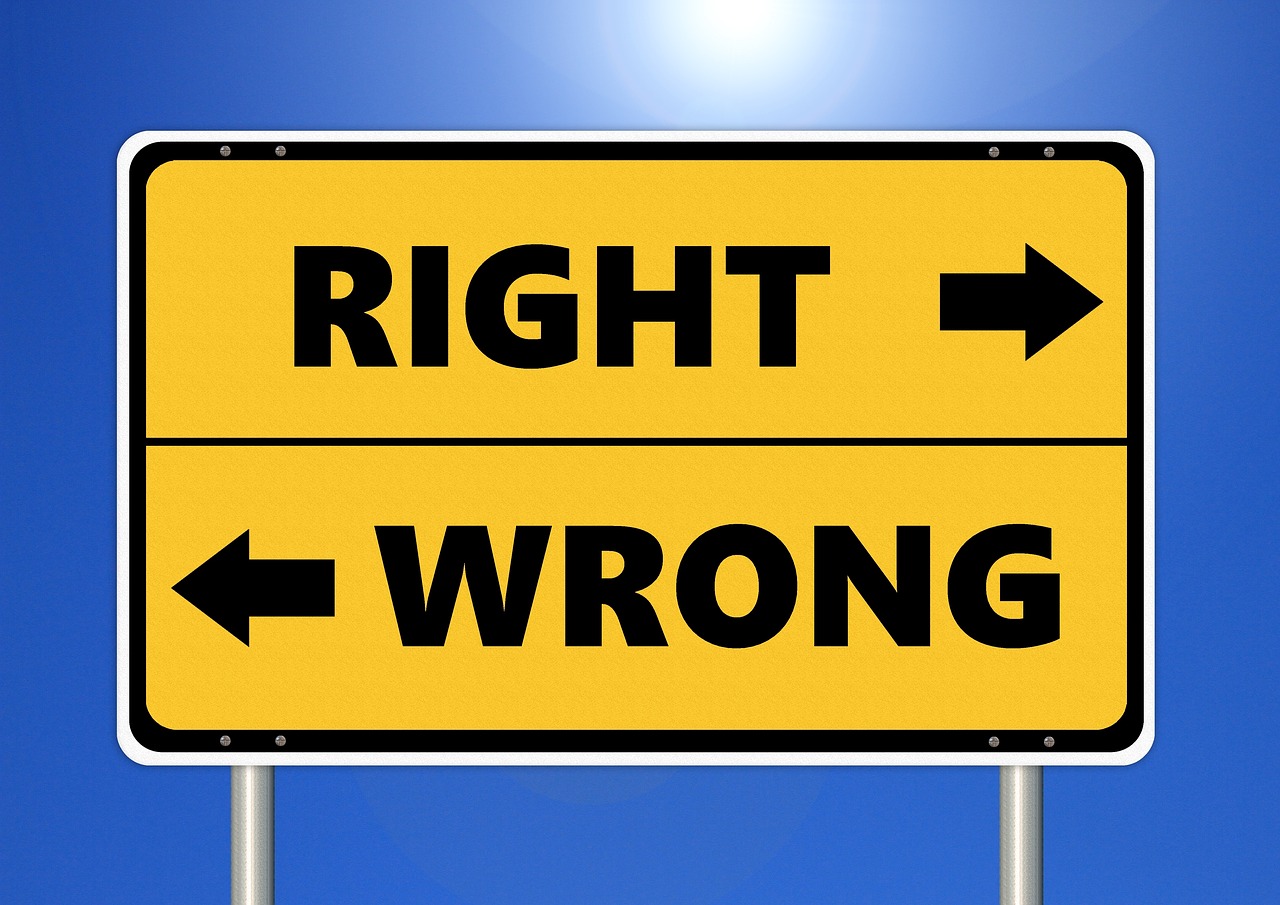
Philosophical Foundations
The debate between pro-choice and pro-life is not just a clash of opinions; it's a profound exploration of our moral compass and the principles that guide our understanding of life and autonomy. At the heart of this discussion lies the question of personhood—when does life truly begin? This question isn't merely academic; it shapes the very foundation of both movements. Pro-life advocates often argue that life begins at conception, asserting that the fetus possesses the same rights as any human being. Conversely, pro-choice supporters argue that personhood is a complex concept that evolves over time, emphasizing a woman's right to make decisions about her own body.
To understand these philosophical foundations, we must consider several key principles that inform each side's beliefs. For pro-life proponents, the sanctity of life is paramount. They often draw on religious and ethical arguments that highlight the inherent value of every human life, suggesting that even a fertilized egg deserves protection. This viewpoint is deeply rooted in various religious teachings, which emphasize the idea that life is a divine gift that should not be interrupted.
On the other hand, the pro-choice perspective is grounded in the principle of bodily autonomy. Advocates argue that individuals should have the right to make choices about their own bodies without external interference. This philosophy not only encompasses the right to terminate a pregnancy but also extends to broader issues of personal freedom and self-determination. The pro-choice argument often posits that forcing a woman to carry an unwanted pregnancy to term is a violation of her rights and can lead to significant social and economic consequences.
The personhood debate is a pivotal aspect of the philosophical discourse surrounding reproductive rights. Different cultural, religious, and scientific perspectives contribute to varying definitions of when life begins. For instance, some argue that personhood begins at conception, while others propose that it begins at viability or birth. This divergence leads to significant moral implications:
| Perspective | Definition of Personhood | Moral Implications |
|---|---|---|
| Pro-Life | Begins at conception | All abortions are morally wrong; life must be protected |
| Pro-Choice | Begins at viability or birth | Women have the right to choose; autonomy is paramount |
These contrasting views not only fuel the debate but also highlight the deep-seated values that individuals hold. For many, this isn't just a theoretical discussion; it touches on their identities, beliefs, and even their faith.
Religious beliefs significantly influence pro-life positions, often emphasizing the sanctity of life as a divine mandate. Many religious groups assert that life is sacred from the moment of conception, leading to a strong moral imperative against abortion. This belief is grounded in various scriptures and teachings that advocate for the protection of the unborn. In contrast, pro-choice advocates may draw upon religious freedom arguments, suggesting that individuals should have the liberty to make decisions based on their own faith and moral understanding.
Secular perspectives often focus on the implications of women's rights and public health considerations. Pro-choice advocates argue that access to safe and legal abortion is essential for women's health and equality. They emphasize that denying this access can lead to dangerous and unsafe procedures, disproportionately affecting marginalized communities. On the other hand, pro-life arguments often center on fetal rights, framing the debate around the idea that every potential life deserves protection.
In conclusion, the philosophical foundations of the pro-choice and pro-life movements reveal a complex interplay of moral beliefs, societal values, and personal experiences. Understanding these foundations is crucial for navigating the ongoing debate over reproductive rights and finding common ground amidst deeply held convictions.
- What is the main difference between pro-choice and pro-life? Pro-choice advocates support the right to choose abortion, while pro-life supporters believe that life begins at conception and oppose abortion.
- How do religious beliefs influence the pro-life movement? Many religious groups assert that life is sacred from conception, leading to a moral obligation to protect the unborn.
- What are the implications of the personhood debate? The definition of personhood affects legal rights and moral considerations surrounding abortion, influencing both pro-choice and pro-life arguments.

Personhood Debate
The question of when life begins is not just a biological inquiry; it is a deeply philosophical and ethical dilemma that lies at the heart of the pro-choice and pro-life debate. This debate is akin to a double-edged sword, with each side wielding arguments that reflect their beliefs about personhood and the rights associated with it. Pro-life advocates argue that life begins at conception, positing that a fetus possesses inherent rights that must be protected. Conversely, pro-choice supporters emphasize the importance of a woman's right to make decisions about her own body, often asserting that personhood—and therefore rights—develop after a certain stage of pregnancy.
To better understand this complex landscape, we can break down the core arguments surrounding personhood into several key perspectives:
- Biological Perspective: From a scientific standpoint, life can be defined by various milestones, such as conception, viability, or birth. This leads to differing opinions on when a fetus should be considered a person.
- Philosophical Perspective: Philosophers often debate the criteria for personhood, which may include consciousness, self-awareness, and the ability to feel pain. These criteria can significantly influence one's stance on abortion.
- Legal Perspective: The legal definition of personhood varies by jurisdiction and can change with new legislation or court rulings. This inconsistency complicates the debate further.
Within this debate, the concept of autonomy is crucial. Pro-choice advocates argue that a woman has the right to control her own body and make choices regarding her reproductive health. This view posits that denying a woman the right to choose is a violation of her autonomy and personal freedom. On the other hand, pro-life advocates contend that the rights of the unborn child must also be considered, arguing that protecting potential life is a moral obligation.
As this discussion unfolds, it is essential to recognize that the personhood debate is not merely academic; it has real-world implications that affect millions of lives. The outcome of this debate influences legislation, healthcare access, and societal norms, making it a pivotal issue in contemporary discussions about reproductive rights.
- What is personhood? Personhood refers to the status of being a person, which carries certain rights and protections under the law.
- When do pro-life advocates believe life begins? Many pro-life advocates believe that life begins at conception, meaning that a fertilized egg is considered a person with rights.
- What do pro-choice advocates argue regarding personhood? Pro-choice advocates often argue that personhood should be defined by factors such as viability or the ability to feel pain, rather than at conception.
- How does the personhood debate affect legislation? The definitions and beliefs surrounding personhood can significantly influence laws regarding abortion and reproductive rights in various jurisdictions.

Religious Perspectives
The debate surrounding pro-choice and pro-life perspectives is deeply intertwined with religious beliefs, which often serve as a guiding force for individuals and communities in forming their opinions on reproductive rights. For many, faith is not just a part of life; it shapes their understanding of morality, ethics, and the value of life itself. This connection can lead to passionate arguments on both sides of the aisle.
On the pro-life side, many religious traditions, particularly within Christianity, emphasize the sanctity of life. They argue that life begins at conception, framing abortion as a moral failing that goes against divine will. For these advocates, the fetus is not just a potential life but a life with inherent rights that must be protected. This belief is often rooted in scriptural interpretations and teachings that stress the importance of every human life. For example, verses like Psalm 139:13-16 are frequently cited to support the notion that God has a plan for each person even before birth.
Conversely, pro-choice advocates often draw from religious tenets that emphasize individual freedom and the importance of personal conscience. Many faiths teach that individuals should have the autonomy to make choices about their own bodies and lives. This perspective argues that while life is sacred, so too is the ability to make decisions based on one's circumstances, beliefs, and understanding of morality. In this light, the act of choosing whether or not to continue a pregnancy can be seen as a deeply personal decision that should not be dictated by external forces, including government or religious institutions.
Interestingly, the religious landscape is not monolithic. Within Christianity alone, there exists a spectrum of beliefs regarding abortion. For instance, some denominations, like the United Church of Christ and the Episcopal Church, support pro-choice policies, arguing that women should have the right to make decisions about their own bodies. They advocate for compassion and understanding, emphasizing that every situation is unique and that the decision to terminate a pregnancy can be a complex and difficult one.
In addition to Christianity, other religions also contribute to the discourse. For example, in Judaism, the perspective on abortion can vary significantly. Traditional Jewish law permits abortion under certain circumstances, particularly when the mother's life is at risk. This nuanced view reflects a broader understanding of the complexities involved in such decisions and highlights the importance of context in moral reasoning.
Ultimately, the intersection of religion and reproductive rights is a dynamic and evolving conversation. As societal values shift and new ethical questions arise, religious perspectives continue to play a pivotal role in shaping the pro-choice and pro-life movements. Understanding these perspectives is crucial for anyone engaging in this debate, as they reveal the deep-seated beliefs that influence individuals' views on one of the most contentious issues of our time.
- What role does religion play in the pro-life movement?
Religion often serves as the foundation for pro-life beliefs, emphasizing the sanctity of life and the moral implications of abortion.
- Are there religious groups that support pro-choice?
Yes, several religious denominations advocate for pro-choice policies, emphasizing individual freedom and the importance of personal conscience.
- How do different religions view the issue of abortion?
Views on abortion vary widely across religions, with some permitting it under specific circumstances, while others strictly oppose it.
- Can religious beliefs change over time regarding abortion?
Yes, as societal values evolve, so can religious interpretations and teachings related to abortion and reproductive rights.

Secular Arguments
When diving into the secular arguments surrounding the pro-choice movement, one can't help but recognize the emphasis on women's rights and public health. These arguments are grounded in the belief that women should have the autonomy to make decisions about their own bodies without governmental interference. This perspective resonates with many who advocate for reproductive rights, as it highlights the importance of personal freedom in a democratic society. Imagine being told you can't make choices about your own life—it's a concept that feels fundamentally un-American, doesn't it?
One of the primary secular arguments is that access to safe and legal abortion is a matter of public health. Research has shown that when abortion is restricted, it doesn't eliminate the need for abortions; rather, it drives women to seek out unsafe procedures. This not only endangers their lives but also places a significant burden on healthcare systems. For instance, a study from the World Health Organization revealed that unsafe abortions account for a substantial number of maternal deaths globally. This statistic underscores the argument that ensuring access to safe abortion services is not just a matter of choice—it's a matter of public health and safety.
Furthermore, proponents of the pro-choice stance argue that the decision to terminate a pregnancy can be influenced by various factors, including financial stability, health concerns, and personal circumstances. These realities often lead to difficult choices that should rest solely with the individual. Consider a young woman who finds herself unexpectedly pregnant while pursuing her education. The ability to choose whether to continue with the pregnancy can significantly impact her future, shaping her career, financial independence, and overall well-being. Denying her this choice could lead to long-term consequences not only for her but also for society as a whole.
Additionally, secular arguments often emphasize the importance of equality and social justice. Women from marginalized communities frequently face greater barriers to accessing reproductive healthcare. Therefore, the pro-choice movement advocates not just for the rights of women in general, but particularly for those who are disadvantaged. This approach aligns with broader social justice efforts that aim to dismantle systemic inequalities. By ensuring that all women have access to reproductive healthcare, society can take significant steps toward achieving true equality.
In summary, the secular arguments in favor of pro-choice are multifaceted, focusing on women's rights, public health, and social equity. They challenge us to consider the real-life implications of restricting access to reproductive healthcare and call for a society that respects individual autonomy and promotes the well-being of all its members. As we navigate this complex landscape, it's crucial to recognize that these discussions are not just about legalities; they are deeply personal and profoundly impactful.
- What is the primary argument for pro-choice? Pro-choice advocates argue that women should have the right to make decisions about their own bodies, including the choice to terminate a pregnancy.
- How do secular arguments differ from religious arguments in this debate? Secular arguments focus on individual rights, public health, and social justice, while religious arguments often emphasize the sanctity of life and moral beliefs about abortion.
- What impact does access to abortion have on women's health? Access to safe and legal abortion is crucial for women's health, as restrictions can lead to unsafe procedures that endanger lives.
- How do societal factors influence a woman's decision to seek an abortion? Factors such as financial stability, personal circumstances, and health concerns can significantly influence a woman's decision regarding pregnancy.

Impact on Women's Rights
The debate surrounding pro-choice and pro-life perspectives has profound implications for women's rights. At its core, the pro-choice movement champions the idea that a woman should have the right to make decisions about her own body, including the choice to terminate a pregnancy. This stance is not merely about abortion; it encapsulates broader issues of autonomy, health care access, and gender equality. When women have the ability to make informed choices about their reproductive health, they are empowered to shape their futures and contribute fully to society.
On the flip side, the pro-life movement argues for the protection of fetal life, often positioning itself as a defender of moral values and the sanctity of life. However, this can lead to significant restrictions on women's reproductive rights, impacting their access to necessary healthcare services. The tension between these two perspectives often manifests in legislation that can either enhance or undermine women's rights. For instance, states with strict abortion laws may inadvertently create barriers to essential health services, affecting not only those seeking abortions but also women needing comprehensive reproductive care.
Moreover, the implications of these stances extend beyond individual choices. They influence societal norms and attitudes towards women’s roles in both the family and the workplace. When women are denied the right to make choices about their reproductive health, it can lead to a cascade of negative outcomes, including:
- Economic Disadvantages: Women may face financial instability if they are compelled to carry unwanted pregnancies to term.
- Health Risks: Lack of access to safe abortion services can lead to unsafe procedures, jeopardizing women's health.
- Social Stigma: Women who seek abortions may face societal judgment, impacting their mental health and social standing.
As we delve deeper into the impact on women's rights, it becomes clear that the conversation is not just about individual choice; it is about ensuring that women can participate fully in society without the constraints of outdated or oppressive laws. The pro-choice movement advocates for policies that promote health equity and access, while the pro-life stance often emphasizes moral and ethical considerations that can overshadow the lived experiences of women.
Ultimately, the ongoing debate highlights the necessity for a balanced approach that respects both the rights of women and the moral considerations surrounding the beginning of life. By fostering open dialogue and understanding, society can work towards solutions that prioritize women's health and autonomy while also addressing the concerns of those who advocate for the rights of the unborn.
Q1: What are the main arguments for the pro-choice movement?
A1: The pro-choice movement primarily advocates for women's autonomy over their bodies, emphasizing the importance of having safe and legal access to abortion and reproductive health services. It also highlights the need for comprehensive sex education and contraceptive access to prevent unwanted pregnancies.
Q2: How do pro-life advocates justify their stance?
A2: Pro-life advocates often argue that life begins at conception and that every fetus has a right to life. They emphasize the moral and ethical implications of abortion and advocate for alternatives such as adoption.
Q3: What impact do laws restricting abortion have on women?
A3: Laws that restrict abortion can lead to increased health risks for women, economic disadvantages, and social stigma. These laws may also limit access to comprehensive reproductive health care, affecting women's overall health and well-being.
Q4: How can society find common ground in this debate?
A4: Finding common ground requires open dialogue and understanding between both sides. This could involve focusing on shared goals, such as reducing unwanted pregnancies through education and access to contraception, while also respecting differing beliefs about life and morality.

Legal Framework
The legal landscape surrounding abortion is a complex web of laws, court rulings, and societal influences that have evolved over time. Understanding this framework is crucial for grasping how pro-choice and pro-life perspectives interact with legal rights and regulations. At the heart of this discussion is the landmark Supreme Court case, Roe v. Wade, decided in 1973, which effectively legalized abortion across the United States. This ruling established a woman's right to choose an abortion under the constitutional right to privacy, a decision that has been both celebrated and contested over the decades.
However, the legal framework does not remain static. In recent years, various states have enacted laws that either protect or restrict access to abortion services, reflecting the ongoing tug-of-war between pro-choice and pro-life advocates. For instance, some states have passed trigger laws that would ban abortions immediately if Roe v. Wade were overturned, while others have implemented protective measures to ensure access to reproductive healthcare. This patchwork of legislation creates a landscape where the availability of abortion services can vary dramatically depending on where one lives.
To illustrate this variation, consider the following table that highlights key differences in abortion laws across several states:
| State | Legal Status of Abortion | Gestational Limits | Notable Restrictions |
|---|---|---|---|
| California | Legal | Up to 24 weeks | None |
| Texas | Restricted | 6 weeks | Mandatory waiting period, counseling |
| New York | Legal | Up to 24 weeks | None |
| Alabama | Highly Restricted | None (near-total ban) | Criminal penalties for providers |
This table underscores the significant disparities that exist across the country. In states like California and New York, access to abortion is relatively straightforward, while in places like Texas and Alabama, restrictive laws can create substantial barriers for women seeking reproductive healthcare. The implications of these laws extend beyond individual choices, influencing public health, economic stability, and even social justice.
Moreover, the legal framework surrounding abortion is often influenced by shifting political landscapes. As new administrations come into power, they can enact changes that either bolster or undermine reproductive rights. Legislative battles at both state and federal levels continue to shape the conversation around abortion, with pro-life advocates pushing for stricter regulations and pro-choice supporters fighting to maintain access to safe and legal abortion services.
In conclusion, the legal framework governing abortion is a dynamic and contentious issue that reflects broader societal values and conflicts. As the debate continues to evolve, it is essential to stay informed about the laws in your state and the ongoing legal battles that could impact reproductive rights for generations to come.
- What is Roe v. Wade? Roe v. Wade is a landmark Supreme Court case that legalized abortion in the United States, establishing a woman's right to choose an abortion under the constitutional right to privacy.
- How do state laws vary regarding abortion? State laws can vary widely, with some states enacting protective measures for abortion access while others impose strict restrictions or bans.
- What are trigger laws? Trigger laws are state laws designed to ban abortions immediately if Roe v. Wade is overturned, reflecting the pro-life movement's goals.
- How do political changes affect abortion laws? Changes in political leadership can lead to shifts in abortion laws, with new administrations enacting policies that either support or restrict reproductive rights.

Landmark Court Cases
The landscape of abortion rights in the United States has been profoundly shaped by a series of landmark court cases that not only defined legal precedents but also influenced societal perceptions of reproductive rights. One of the most pivotal cases, Roe v. Wade, decided in 1973, established a woman's legal right to abortion under the constitutional right to privacy. This case set off a wave of legal, social, and political debates that continue to this day. The Supreme Court's ruling in Roe v. Wade was revolutionary, as it recognized that the decision to terminate a pregnancy is a deeply personal choice, intertwined with issues of bodily autonomy and privacy.
However, the legal journey did not stop there. In 1992, the Supreme Court revisited the issue in Planned Parenthood v. Casey, which upheld the core holding of Roe v. Wade while allowing states to impose certain restrictions on abortion, provided they did not place an "undue burden" on a woman's right to choose. This case introduced the concept of "viability," emphasizing the state's interest in protecting potential life as pregnancy progresses. The ruling was a significant moment for both pro-choice and pro-life advocates, as it allowed for some state regulation without completely overturning the federal protections established in Roe.
As we move through the years, we see a pattern of cases that either strengthen or challenge the established rights surrounding abortion. For instance, in Whole Woman's Health v. Hellerstedt (2016), the Supreme Court struck down Texas laws that imposed strict regulations on abortion clinics, ruling that they placed an undue burden on women seeking abortions. This decision was celebrated by pro-choice advocates as a victory for women's health and access, reinforcing the idea that regulations must not infringe upon a woman's fundamental rights.
On the flip side, we have seen states push the envelope with laws designed to challenge Roe v. Wade directly. Recent cases, such as the Dobbs v. Jackson Women's Health Organization, which is currently before the Supreme Court, aim to overturn or significantly alter the legal framework established by Roe and Casey. The outcome of such cases can have far-reaching implications, potentially leading to a patchwork of laws that vary significantly from state to state, affecting access to abortion and reproductive healthcare across the nation.
In summary, landmark court cases have been instrumental in shaping the pro-choice and pro-life dialogue in America. They reflect not only the evolving legal interpretations of abortion rights but also the shifting cultural attitudes towards women's autonomy and reproductive health. As we continue to navigate this complex issue, the implications of these cases will undoubtedly resonate through future legal battles and societal debates.
- What is Roe v. Wade? - Roe v. Wade is a landmark Supreme Court case from 1973 that legalized abortion nationwide by recognizing a woman's right to privacy.
- What did the Planned Parenthood v. Casey decision establish? - This 1992 case upheld Roe v. Wade while allowing states to impose some restrictions on abortion, as long as they do not create an undue burden on women.
- How do recent court cases affect abortion rights? - Recent cases, like Dobbs v. Jackson Women's Health Organization, could potentially overturn Roe v. Wade, leading to significant changes in abortion laws across different states.

State Legislation Variations
The landscape of abortion legislation in the United States is as diverse as the states themselves. Each state has the power to create its own laws regarding abortion, leading to a patchwork of regulations that can be bewildering for individuals seeking reproductive health services. This variation is influenced by a multitude of factors, including cultural beliefs, political climates, and the prevailing attitudes of the populace towards reproductive rights. For instance, some states have enacted laws that are highly restrictive, imposing waiting periods, mandatory counseling, and even limiting the timeframe in which an abortion can be performed. In stark contrast, other states have taken steps to protect and expand access to abortion services, often enshrining these rights in state constitutions or statutes.
To illustrate this complexity, consider the following table that summarizes the key differences in abortion legislation across several states:
| State | Legal Status | Restrictions | Gestational Limits |
|---|---|---|---|
| California | Legal | None | Up to birth |
| Texas | Legal | Mandatory waiting period, counseling | 6 weeks |
| Florida | Legal | 24-hour waiting period | 15 weeks |
| Alabama | Legal but highly restricted | Near-total ban with few exceptions | None |
This table highlights the stark contrasts in abortion laws across the nation. For example, while California offers broad access to abortion services, Texas has imposed strict regulations that can significantly limit a woman's ability to make choices about her own body. This inconsistency can lead to confusion and hardship, particularly for those living in states with stringent laws who may need to travel long distances to access care.
Moreover, the political landscape plays a crucial role in shaping these laws. States with more progressive leadership tend to enact policies that support reproductive rights, while conservative states often push for more restrictive measures. This dynamic creates a tug-of-war effect, where advocacy groups on both sides are continually battling to influence legislation. The implications of these variations are profound, affecting not only individual rights but also broader societal issues such as healthcare accessibility and women's autonomy.
In conclusion, the variations in state legislation regarding abortion are reflective of deeper societal values and beliefs. As the debate continues to evolve, it is essential for individuals to stay informed about the laws in their respective states, as these regulations can have significant impacts on their lives and choices.
- What is the current legal status of abortion in the United States? Abortion remains legal in many states, but access varies significantly due to state-specific laws and regulations.
- How do state laws impact access to abortion services? Differences in state laws can create barriers to access, such as mandatory waiting periods, counseling requirements, and gestational limits.
- What should I do if I need an abortion and live in a restrictive state? It is advisable to research the laws in your state and consider reaching out to local reproductive health organizations for guidance and support.

Social Implications
The ongoing debate between pro-choice and pro-life movements has profound that ripple through communities, affecting not just individual lives but also the broader societal fabric. At the heart of this discourse is the struggle for women's autonomy and the quest for equitable access to healthcare services. When we talk about abortion rights, we aren't just discussing a medical procedure; we're delving into issues of gender equality, economic stability, and the very essence of personal freedom.
In many ways, the pro-choice movement champions the idea that women should have control over their bodies and reproductive choices. This perspective is crucial in a society where gender disparities still exist. For instance, consider the economic impact: women who can make informed choices about their reproductive health are more likely to pursue education and careers, contributing positively to the economy. Conversely, restrictive abortion laws can lead to increased poverty levels, as women may find themselves unable to escape cycles of dependency due to unplanned pregnancies.
On the flip side, the pro-life movement emphasizes the sanctity of life, arguing that every fetus has the right to be born. While this is a deeply held belief for many, it can sometimes overshadow the realities faced by women in difficult circumstances. The social implications of this stance can lead to stigma surrounding those who seek abortions, creating an environment where women feel isolated and judged. This stigma can deter women from seeking necessary healthcare services, leading to more significant public health issues.
Moreover, the pro-life perspective often intersects with various social issues, such as education and healthcare access. In communities where pro-life ideologies dominate, comprehensive sex education and access to contraceptives may be limited. This lack of education can result in higher rates of unintended pregnancies, thereby perpetuating the cycle of poverty and limiting opportunities for women. In contrast, pro-choice advocates argue for the necessity of informed choices and the availability of reproductive health resources to empower women and promote social equity.
As a society, we must also consider the impact of these movements on public policy. Laws and regulations surrounding abortion can influence funding for healthcare services, educational programs, and social support systems. For example, states that adopt restrictive abortion laws often see cuts to social services that support families, which can lead to increased hardship for those in need. In contrast, states that prioritize reproductive rights tend to invest more in healthcare and education, fostering environments where families can thrive.
To illustrate the stark contrast in social implications between pro-choice and pro-life states, consider the following table that highlights key differences in healthcare access and educational resources:
| Aspect | Pro-Choice States | Pro-Life States |
|---|---|---|
| Access to Abortion Services | Widely available | Highly restricted |
| Comprehensive Sex Education | Mandatory in schools | Often limited or absent |
| Healthcare Funding | Increased funding for reproductive health | Potential cuts to social services |
| Support for Unplanned Pregnancies | Robust support systems | Limited resources available |
Ultimately, the social implications of the pro-choice and pro-life movements are complex and multifaceted. They touch on the very core of what it means to be a part of a community, influencing everything from healthcare access to educational opportunities. As we navigate this landscape, it's essential to engage in open dialogues that consider the diverse perspectives and lived experiences of individuals on both sides of the debate. The goal should be to foster a society that values both life and choice, recognizing the intricate balance required to support all members of our community.
- What is the main difference between pro-choice and pro-life movements?
Pro-choice advocates support a woman's right to choose whether to have an abortion, while pro-life supporters believe that life begins at conception and advocate for the rights of the unborn.
- How do pro-choice and pro-life perspectives affect women's health?
Pro-choice perspectives generally promote access to comprehensive healthcare, including reproductive services, whereas pro-life perspectives may impose restrictions that limit access to these services.
- What role does education play in the pro-choice and pro-life debate?
Education, particularly comprehensive sex education, is often championed by pro-choice advocates as a means to reduce unintended pregnancies, while pro-life advocates may support abstinence-only education.
Frequently Asked Questions
- What is the main difference between pro-choice and pro-life?
The pro-choice movement advocates for a woman's right to make decisions about her own body, including the choice to have an abortion. In contrast, the pro-life movement believes that life begins at conception and that the fetus has a right to life, advocating against abortion.
- How do historical events shape the pro-choice and pro-life movements?
Historical events, such as landmark court cases and changes in societal values, have played a crucial role in shaping both movements. For instance, the Roe v. Wade decision in 1973 significantly impacted the legal landscape of abortion rights in the U.S., influencing public opinion and activism on both sides.
- What are some common philosophical arguments for pro-choice?
Pro-choice advocates often argue from the perspective of bodily autonomy, asserting that individuals should have the right to make personal medical decisions without government interference. They also emphasize women's rights and the importance of access to safe healthcare options.
- What role do religious beliefs play in the pro-life stance?
Religious beliefs are a cornerstone of the pro-life movement, with many adherents viewing life as sacred from the moment of conception. This perspective often leads to strong opposition to abortion based on the belief that it is morally wrong to end a potential life.
- How do state laws affect access to abortion services?
State laws vary widely, with some states enacting restrictive measures that limit access to abortion, while others protect and expand reproductive rights. These differences can create significant barriers for women seeking abortion services, depending on where they live.
- What are some key court cases related to abortion rights?
Key court cases, such as Roe v. Wade and Planned Parenthood v. Casey, have established important legal precedents regarding abortion rights. These cases have been pivotal in defining the legal framework surrounding reproductive rights in the United States.
- How does the pro-choice movement address concerns about fetal rights?
The pro-choice movement often acknowledges the complexity of fetal rights but emphasizes that a woman's right to choose should take precedence. Advocates argue that decisions about pregnancy and abortion should remain personal and not be dictated by the government.
- What social implications arise from the pro-choice and pro-life debates?
The debates surrounding pro-choice and pro-life perspectives have significant social implications, influencing community dynamics, healthcare access, and public policy. These discussions can affect how individuals view women's rights and reproductive health in society.


